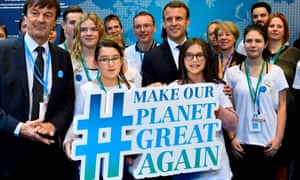For an issue that often seems to lurch from crisis to catastrophe, the steady but vital progress at the UN’s global climate change talks
in Bonn was reassuring. But there remains a very long way to go before
the world gets on track to avoid catastrophic levels of global warming.
There was little drama as the diplomatic sherpas trekked up the mountain of turning the political triumph of the 2015 Paris agreement into a technical reality, with a rulebook that would allow countries to start ramping up action. They got about as far as expected in turning the conceptual into the textual, but no further.
But that is not to say there were no star turns. Timoci Naulusala, a 12-year-old Fijian boy, gave a passionate yet nerveless account of the destruction of his village by Cyclone Winston in 2016 to the gathered heads of state and ministers. “Climate change is real, not a dream,” he said.
The French president, Emmanuel Macron, turned on the charisma and heartened the gathered nations with a pledge to replace the US funding dumped by Donald Trump for the UN’s climate science body.
https://www.youtube.com/watch?v=u4PXL72Vjxw
Timoci Naulusala speaks at the global climate change talks
The Trump administration, which wants the US to be the only country in the world not in the Paris deal, was the pantomime villain, but only succeeded in uniting the 195 other nations against it. The sole US event brought an executive from Peabody, the US coal company with a long history of funding climate denial, to argue for “clean coal”. A protest song and walkout from most of the audience followed and for the rest of the summit, the US delegation was irrelevant.
But the large coalition of US cities and states backing climate action – which as a group represents the third-largest economy in the world – stole the American show, with the California governor, Jerry Brown, popping up everywhere, pumping up the crowds.
The multi-nation pledge to phase out coal use was the political high point, but the dragging on of the coalition talks in Germany prevented Angela Merkel from potentially joining the party. The politics is key: UN climate talks run on consensus, with no votes, so trust and momentum are vital and were preserved in Bonn.
But the summit was like a dress rehearsal for next year, when the Paris rulebook has to be finalised and poorer and vulnerable nations will demand much more action and funding from the rich countries they blame for climate change. Further gatherings in Paris in December and California next year will also help prepare the stage for the 2018 UN climate summit.
That will be in Silesia, a heartland of Europe’s King Coal, Poland, which has already started feeling the international pressure to clean up its act. If that summit achieves its goals – accelerating carbon cuts – then the curtain will have been raised on the clean, green 21st century, against a backdrop of the mines and power plants of the 20th century.
There was little drama as the diplomatic sherpas trekked up the mountain of turning the political triumph of the 2015 Paris agreement into a technical reality, with a rulebook that would allow countries to start ramping up action. They got about as far as expected in turning the conceptual into the textual, but no further.
But that is not to say there were no star turns. Timoci Naulusala, a 12-year-old Fijian boy, gave a passionate yet nerveless account of the destruction of his village by Cyclone Winston in 2016 to the gathered heads of state and ministers. “Climate change is real, not a dream,” he said.
The French president, Emmanuel Macron, turned on the charisma and heartened the gathered nations with a pledge to replace the US funding dumped by Donald Trump for the UN’s climate science body.
https://www.youtube.com/watch?v=u4PXL72Vjxw
Timoci Naulusala speaks at the global climate change talks
The Trump administration, which wants the US to be the only country in the world not in the Paris deal, was the pantomime villain, but only succeeded in uniting the 195 other nations against it. The sole US event brought an executive from Peabody, the US coal company with a long history of funding climate denial, to argue for “clean coal”. A protest song and walkout from most of the audience followed and for the rest of the summit, the US delegation was irrelevant.
But the large coalition of US cities and states backing climate action – which as a group represents the third-largest economy in the world – stole the American show, with the California governor, Jerry Brown, popping up everywhere, pumping up the crowds.
The multi-nation pledge to phase out coal use was the political high point, but the dragging on of the coalition talks in Germany prevented Angela Merkel from potentially joining the party. The politics is key: UN climate talks run on consensus, with no votes, so trust and momentum are vital and were preserved in Bonn.
But the summit was like a dress rehearsal for next year, when the Paris rulebook has to be finalised and poorer and vulnerable nations will demand much more action and funding from the rich countries they blame for climate change. Further gatherings in Paris in December and California next year will also help prepare the stage for the 2018 UN climate summit.
That will be in Silesia, a heartland of Europe’s King Coal, Poland, which has already started feeling the international pressure to clean up its act. If that summit achieves its goals – accelerating carbon cuts – then the curtain will have been raised on the clean, green 21st century, against a backdrop of the mines and power plants of the 20th century.

No comments:
Post a Comment